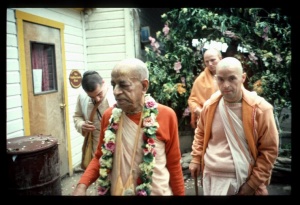SB 8.3.5

A.C. Bhaktivedanta Swami Prabhupada
TEXT 5
kālena pañcatvam iteṣu kṛtsnaśo
lokeṣu pāleṣu ca sarva-hetuṣu
tamas tadāsīd gahanaṁ gabhīraṁ
yas tasya pāre 'bhivirājate vibhuḥ
SYNONYMS
kālena—in due course of time (after millions and millions of years); pañcatvam—when everything illusory is annihilated; iteṣu—all transformations; kṛtsnaśaḥ—with everything within this cosmic manifestation; lokeṣu—all the planets, or everything that exists; pāleṣu—maintainers like Lord Brahmā; ca—also; sarva-hetuṣu—all causative existences; tamaḥ—great darkness; tadā—then; āsīt—was; gahanam—very dense; gabhīram—very deep; yaḥ—the Supreme Personality of Godhead who; tasya—this dark situation; pāre—over and above; abhivirājate—exists or shines; vibhuḥ—the Supreme.
TRANSLATION
In due course of time, when all the causative and effective manifestations of the universe, including the planets and their directors and maintainers, are annihilated, there is a situation of dense darkness. Above this darkness, however, is the Supreme Personality of Godhead. I take shelter of His lotus feet.
PURPORT
From the Vedic mantras we understand that the Supreme Personality of Godhead is above everything. He is supreme, above all the demigods, including Lord Brahmā and Lord Śiva. He is the supreme controller. When everything disappears by the influence of His energy, the cosmic situation is one of dense darkness. The Supreme Lord, however, is the sunshine, as confirmed in the Vedic mantras: āditya-varṇaṁ tamasaḥ parastāt. In our daily experience, when we on earth are in the darkness of night, the sun is always luminous somewhere in the sky. Similarly, the Supreme Personality of Godhead, the supreme sun, always remains luminous, even when the entire cosmic manifestation is annihilated in due course of time.